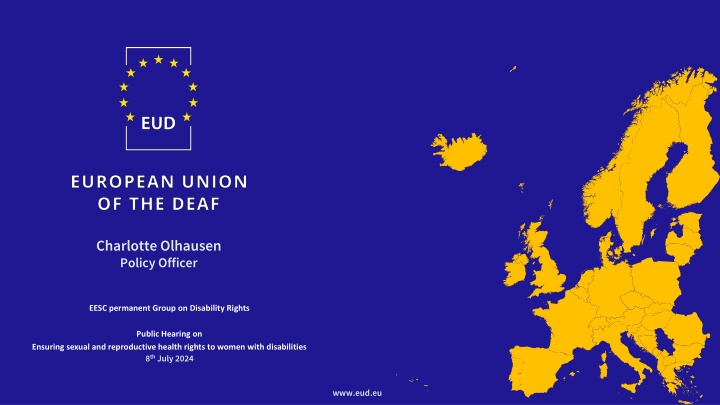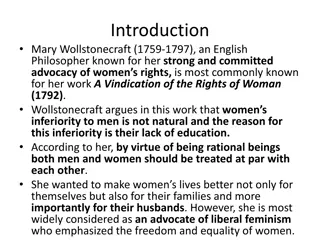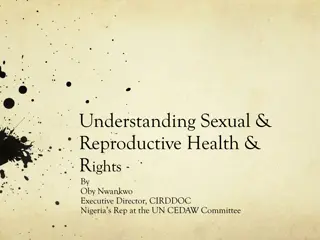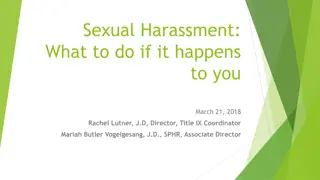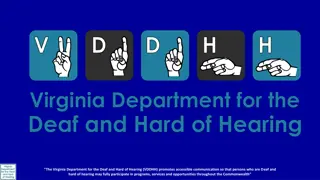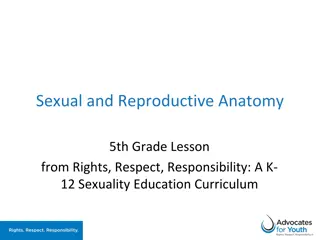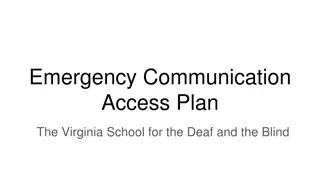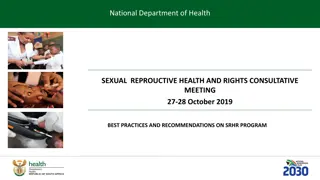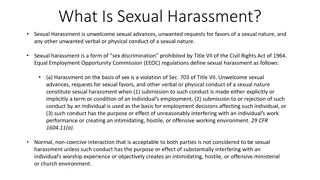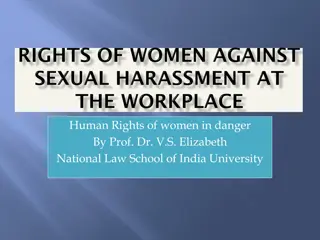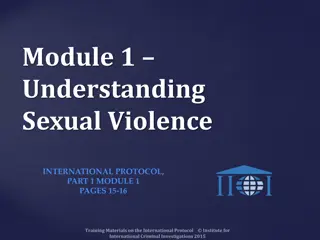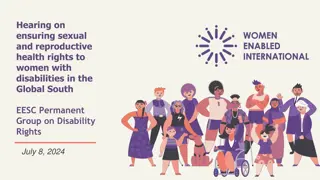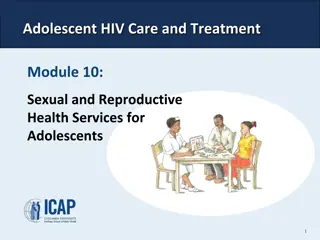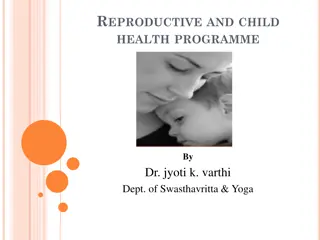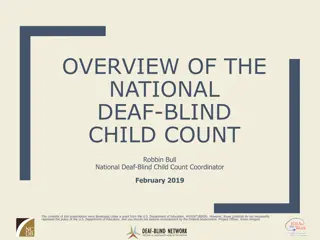Challenges Faced by Deaf Women in Accessing Sexual and Reproductive Health Rights
Deaf women encounter significant obstacles in exercising their sexual and reproductive health rights, including gender-based violence, discrimination, and communication barriers. The European Union of the Deaf highlights critical issues such as systemic marginalization, lack of information in sign language, and medical professionals' negative attitudes. Legal frameworks such as the EU Directive on Combatting Violence against Women play a crucial role in addressing these challenges to ensure equal rights for deaf women.
Uploaded on Sep 14, 2024 | 3 Views
Download Presentation

Please find below an Image/Link to download the presentation.
The content on the website is provided AS IS for your information and personal use only. It may not be sold, licensed, or shared on other websites without obtaining consent from the author.If you encounter any issues during the download, it is possible that the publisher has removed the file from their server.
You are allowed to download the files provided on this website for personal or commercial use, subject to the condition that they are used lawfully. All files are the property of their respective owners.
The content on the website is provided AS IS for your information and personal use only. It may not be sold, licensed, or shared on other websites without obtaining consent from the author.
E N D
Presentation Transcript
Charlotte Olhausen Policy Officer EESC permanent Group on Disability Rights Public Hearing on Ensuring sexual and reproductive health rights to women with disabilities 8th July 2024 www.eud.eu
Overview of the European Union of the Deaf EUD is based in Brussels and is a not-for-profit European non- Governmental organisation (ENGO) whose members comprise of National Associations of the Deaf (NADs). EUD is the only supranational organisation representing Deaf people at European level and is one of the few ENGOs representing associations from all of the 27 EU Member States, in addition to Iceland, Norway, Switzerland and the United Kingdom. www.eud.eu
EUD Report Combatting Gender-based Violence and Discrimination against Deaf Women and Girls in the EU (March 2024) Highlights the intersecting forms of gender-based violence (GBV) and gender-based discrimination faced by deaf women and girls in the European Union (EU) The gap between the lived experiences and the legal provisions is exposed Informed by women representatives from the deaf community via a focus group with women representatives from our members the National Associations of the Deaf. The focus group highlighted grave situations of discrimination in the healthcare field, specifically related to sexual and reproductive health www.eud.eu
Main Issues faced by Deaf Women and Girls in excercising their right to sexual and reproductive healthcare At a heightened risk of experiencing gender-based violence (GBV) and intersectional discrimination based on their gender, disability, and language (national sign languages) E.g. Medical professionals take advantage of the language barrier as an excuse not to inform deaf women of decisions around reproductive health e.g. abortion, forced sterilisation. Face systemic marginalization, attitudinal, and communication barriers when accessing their sexual and reproductive rights Lack of access to information on sexual and reproductive healthcare and rights in the national sign language = intersectional discrimination (linguistic, disability-, and gender-based.) Medical approach (rather than human rights-based) to family planning - deafness is often viewed in a negative light by medical professionals, resulting in the experience of GBV such as forced sterilisation, forced/coercive abortion, denial of IVF treatment based on disability, amongst others. www.eud.eu
EU Legal and Policy Framework EU Directive on Combatting Violence against Women and Domestic Violence (adopted 2024) EU Gender Equality Strategy; EU Disability Rights Strategy 2021-2030; EU Pillar of Social Rights CRPD - The EU, having ratified the CRPD, is obliged to: Article 6 Women with Disabilities recognize that women and girls with disabilities are subject to multiple discrimination, and to take measures to ensure the full and equal enjoyment by them of all human rights and fundamental freedoms. Article 2, section 1(c) - ensure that Persons with disabilities, including children, retain their fertility on an equal basis with others. Article 16.2 - implement all necessary steps to stop exploitation, violence, and abuse. Article 23.1(b) - ensure access to age-appropriate information, reproductive and family planning education are recognised, and the means necessary to enable them to exercise these rights are provided Article 23.1(b) - ensure the rights of persons with disabilities to choose freely, taking responsible consideration, on the number of children they would like to have. www.eud.eu
Policy Recommendations EU Institutions: Collection of reliable disaggregated data on deaf women and girls regarding GBV and gender-based discrimination to inform policies and other initiatives; Meaningfully involve deaf women and girls via their representative organisations, to review the EU s approach, services and facilities to protect women from GBV e.g. emergency hotlines, justice services, awareness raising campaigns, reporting procedures etc. to become accessible in the national sign language; Push for the unblocking and adoption of and enforcement of the EU anti-discrimination directive protecting deaf women from any discrimination on the basis of gender, disability and the use of their national sign language, including in healthcare settings; All relevant legislation must provide comprehensive definitions of discrimination on the basis of disability, reasonable accommodation, and accessibility; Design of an EU-level website which provides all information on rights associated with GBV/discrimination, the available support services, trained national sign language interpreters etc. for deaf victims of GBV and gender- based discrimination. www.eud.eu
Policy Recommendations EU Member States - Collection of reliable disaggregated data on deaf women and girls regarding GBV and gender-based discrimination to inform policies and other initiatives; - Design of accessible initiatives to address attitudinal barriers to the right of deaf women to become mothers (whether via natural means, IVF, or adoption); - Establishment of reporting mechanisms in the national sign language when intersectional discrimination in healthcare (or otherwise) arises; - Accessible awareness-raising programmes, in the national sign language, to inform deaf women and girls of their rights in relation to GBV and gender-based discrimination; - Criminalisation of rape, forced sterilisation and genital mutilation at the national level. www.eud.eu
Many thanks! Please get in touch if you would like to know more charlotte.olhausen@eud.eu www.eud.eu
